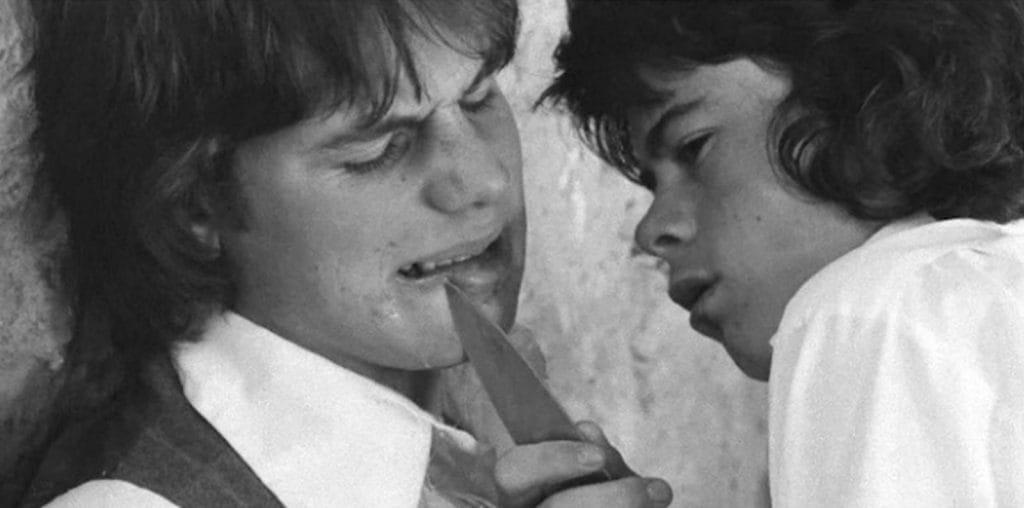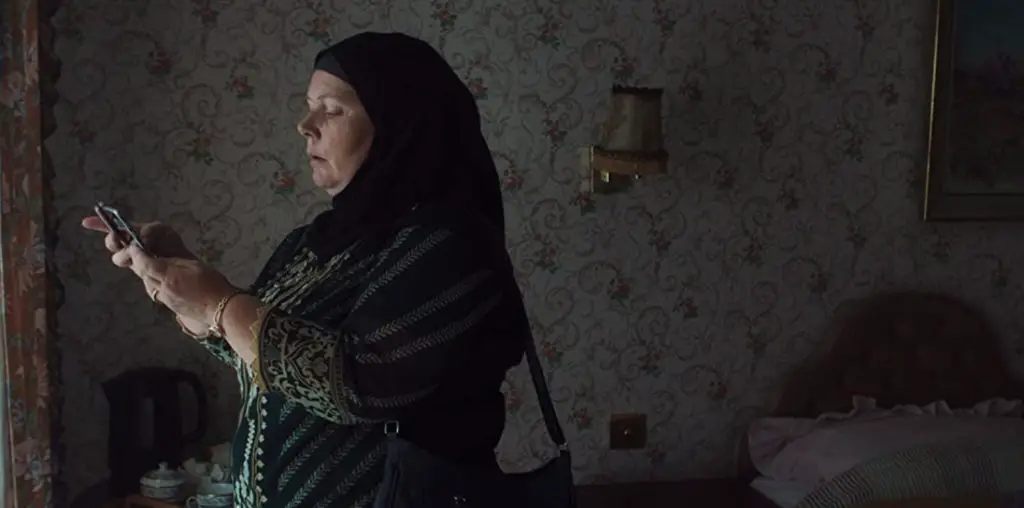
At SXSW, Aimee Lagos introduced “96 Minutes” by saying that it was about the people who “don’t normally have their stories told.” In actuality, these people she refers to have their stories told frequently, but it’s usually from a morally superior and monochromatic Caucasian point of view. Audiences and critics will inevitably (and rightfully) compare this film to Paul Haggis’ “Crash.” Depending on whom you ask, this is either a compliment or an insult. As far as I’m concerned, “Crash” is the most racist, condescending movie ever to win an Academy Award. Knowing that, you can probably surmise my position on “96 Minutes.”
Worlds collide when co-eds, Carley and Lena, are carjacked by two troubled boys named Kevin and Dre who hail from the wrong side of the tracks (LITERALLY). The story is told in the ever-popular non-linear style, cutting between the present drama and the events in their respective lives that brought them to this point. Kevin is a poor white boy who fancies himself a gangsta-in-training. Dre is Kevin’s African American cousin who just wants to trade in his A-to-the-mothafuckin-K for a cap and gown. Dre only had one more day till retirement…I mean, GRADUATION…when Kevin got him involved in these shenanigans. The boys are in a bit of a pickle because Lena is bleeding from a bullet hole in her face, a semi-accidental love letter that Kevin sent her when she wouldn’t cooperate. Dre really wants to do the right thing, but for some reason, he isn’t sure what that is.
Some have argued that these characters aren’t stereotypes because people like them actually exist. I’m not denying that gangs and gang violence are real issues. People get carjacked. Young middle-class women feel neglected by their business-obsessed fathers. Young hooligans listen to violent music, play first-person shooter games and fantasize about popping a cap in the a*s of the man who beats their mom. It’s just that when you bring all of these people together, it starts to feel like a very special episode of “Beverly Hills 90210.” I’m still not sure what Lagos is getting at with this film. Is it that kids who grow up in the ghetto will inevitably join a gang? Is it that all a troubled kid needs is to listen to the middle-class, educated, white woman when she tells him, “You don’t have to do this”? Or maybe Lagos just wants to know why we can’t all just get along, man. At times, it definitely feels as if she is comparing the problems of these college students with the troubles of the ghetto, as though they could really learn something from each other and maybe aren’t that different. As though an inattentive father or unfaithful boyfriend is on par with being abused by your mother’s boyfriend or having no dad at all.
It’s not just the stereotypes that are the problem. The ham-fisted dialog is straight from an after school special. The big, menacing ganstas who coerce Kevin into jacking a car as an initiation warn him, “This ain’t playtime. This s**t here’s fo real.” At one point, Dre argues, “I got a gun in my hand cos I don’t see any other way out.” It’s a real seat-squirmer but not because s**t gets too real. It’s because of lines like that and the borderline cartoon racism on screen. When Dre is walking home from school, two cops jump him. One is black and one is white. They both beat him down, claiming that he looked suspicious, but the black cop is much more violent with Dre. You might say that the black police officer was showing off for the white one. I guess Lagos has heard that N.W.A. song too. Meanwhile, an old woman watches from her window and when Dre looks to her for help, she closes the curtain. Later, some other cops question a kindly BBQ restaurant owner named Duane (David Oyelowo), and they appear to accuse him of the crime he is reporting to them. He rolls his eyes and I can’t help but think there was a little bit of actor commentary in his performance.
The acting is the only thing I can’t complain about. Everyone does their best with what they’re given. The mean old thugs try to instill more than just black-hat villainy into their characters. Evan Ross won an award at SXSW for his role as Dre. I wish it had been for something a bit more worthy of his talents. For my money, David Oyelowo is the best of the bunch, owning every scene he’s in and somehow selling a particularly sappy phone call to his nephew.
Lagos does her best to distract from her shoddy storytelling with a couple of popular indie filmmaking tricks. She uses color-coding, contrasting the washed out, gritty ghetto with the colorful, sunny college campus and the white bread town in which it sits. The scenes in the car are a dim yellow, lit only by streetlamps and stoplights, keeping the audience as well as the characters in the dark. The non-linear narrative does hold your attention, at least until the time line catches up. You can’t deny the tension of a girl bleeding out in the backseat of a moving car. But Lagos is a conjurer of cheap tricks. Whenever the story jumps to the events pre-jacking, we’re painfully reminded what kind of movie this is. It’s the unfortunate outcome of misplaced white guilt. When the ride is finally over, that’s when the preaching kicks into high gear. I too suffer from white guilt. It’s over the fact that films like this get made. I’m SO sorry.


Thanks, Mark. It’s tough because I do call out the director, but it’s mostly to personify the film. Otherwise, the wording gets a little funky. Ultimately, I’m not rating Lagos as a person, I’m only rating her film.
Pot calling kettle black. Maybe if you weren’t so nasty in the way you speak of people, you would elicit less harsh feelings back… Revolutionary idea, I know, but one that seems possibly unfamiliar.
She was speaking about, and reviewing, a movie. Why does that automatically equate to personal nastiness? She’s being critical of a film, you’re being critical of her personally; not the same thing.
My interpretation of the gang rebuking Kevin was that they did it, not because he killed someone, but because he killed someone from the college community. Isn’t most gang violence against members of other gangs?
As far as calling it a cliche, I still think it is valid in relation to the points stated above. A cliche doesn’t mean that what they’re portraying is a myth. It means that it is portrayed in that way so much that it has lost all meaning. In terms of a fictional narrative, it helps to make a story more believable if you haven’t seen it before. We’ve all seen character like this a million times. In a documentary, the realism is inherent so even stories you’ve seen before seem a lot fresher. Personally, I’d rather see a documentary about those kids you’ve worked with.
As for my “judgment”, that’s what a review is. A judgment of a film. Why are you reading reviews if you don’t want to know how someone else judged it?
You know what I really love? Debating about the merits of a film. I think it’s what keeps these comment sections fresh and exciting. I just wish it could happen without people feeling the need to make it personal.
Don and I were discussing that in the podcast: why can’t disagreements in opinion be that, without personal insults to or about the person you disagree with? I wish people treated each other online with the same level of civility, forced or not, that they’d treat someone with in person. It’s hard to have an intelligent discussion or debate on a topic when someone has already insulted me, my upbringing or any number of other random ignorance about me and mine.
I couldn’t disagree more with this review…. Saw the film at the final screening of SxSW and really felt like it was powerful. To the contrary, it had nothing to do with race. Race wasn’t brought up once. The ethnic make up of the film was mixed across the board. In fact, the only thing this film shares in common with CRASH is that it’s a multiple storyline drama. And while you state that it’s cliche, it was anything but. To the contrary, the character who is bound to make all the right choices makes only wrong choices, the “gang bangers” are nothing but talk and in the face of a real murder, rebuke Kevin. And as someone who has real world experience with kids at a teen shelter, I can say first hand that many of them do get hassled by cops every day and I’ve seen it with my own eyes. Before you start throwing your judgements around, maybe your should not only check your “white guilt” but also your over educated, middle to upper class POV.
This is what I’ve been saying about Crash since it came out, ‘cept no one was on the same boat.